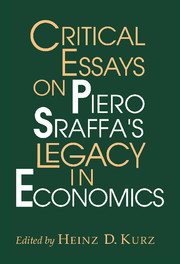Book contents
- Frontmatter
- Contents
- Preface
- List of contributors
- Part I Introduction
- Part II Returns to scale, demand, money and interest, and the classical tradition
- 3 Sraffa's hits and misses
- 4 Sraffa on demand: a textual analysis
- 5 Malthus and the corn–profit model
- 6 The Hayek–Keynes–Sraffa controversy reconsidered
- Part III Long-period theory and the problem of capital
- Part IV Intertemporal equilibrium theory and the problem of capital
- Mathematical Note by Michele Tucci
- Author index
- Subject index
6 - The Hayek–Keynes–Sraffa controversy reconsidered
Published online by Cambridge University Press: 05 June 2012
- Frontmatter
- Contents
- Preface
- List of contributors
- Part I Introduction
- Part II Returns to scale, demand, money and interest, and the classical tradition
- 3 Sraffa's hits and misses
- 4 Sraffa on demand: a textual analysis
- 5 Malthus and the corn–profit model
- 6 The Hayek–Keynes–Sraffa controversy reconsidered
- Part III Long-period theory and the problem of capital
- Part IV Intertemporal equilibrium theory and the problem of capital
- Mathematical Note by Michele Tucci
- Author index
- Subject index
Summary
Introduction
Piero Sraffa's debate with Friedrich August von Hayek subsequent to the publication of Hayek's Prices and Production in 1931 (Hayek, 1931b) has met with serious difficulties of understanding and was subject to vastly diverging interpretations. In a letter to Oskar Morgenstern, Frank Knight wrote: ‘I wish he [Hayek] or someone would try to tell me in a plain grammatical sentence what the controversy between Sraffa and Hayek is about. I haven't been able to find anyone on this side who has the least idea’ (quoted in Lawlor and Horn, 1992, p. 319, fn.). This view is echoed in the introduction to Vol. 9 of The Collected Works of F. A. Hayek, entitled Contra Keynes and Cambridge, in which the editor maintains that ‘the Hayek–Sraffa duel lacks clarity’ (Caldwell, 1995, p.37). Other interpreters opined that despite the heat that emanated from the controversy, the positions advocated by the adversaries, far from being the two sides of a debate, passed each other without touching, like ships in the night (cf. for example, McCloughry, 1982). Since Sraffa's critique of Hayek's monetary theory of overinvestment was formulated at an important stage of his investigations in the theory of value and distribution, it is perhaps useful to reconsider this debate. His contribution may be expected to reveal his understanding of traditional marginalist doctrines and bear witness to his remarkable analytical skills and impeccable logic. As will be seen, this expectation is indeed met.
- Type
- Chapter
- Information
- Critical Essays on Piero Sraffa's Legacy in Economics , pp. 257 - 302Publisher: Cambridge University PressPrint publication year: 2000
- 16
- Cited by



